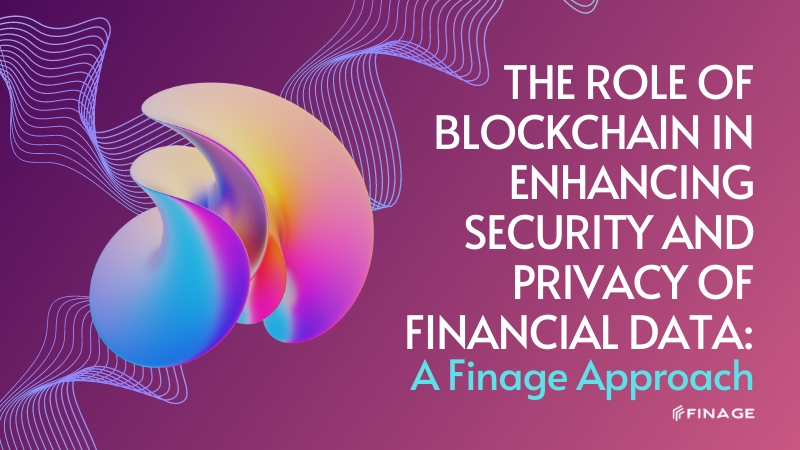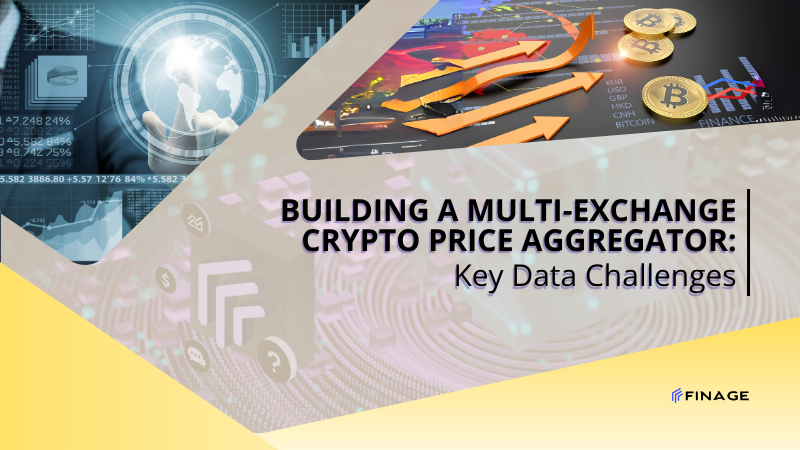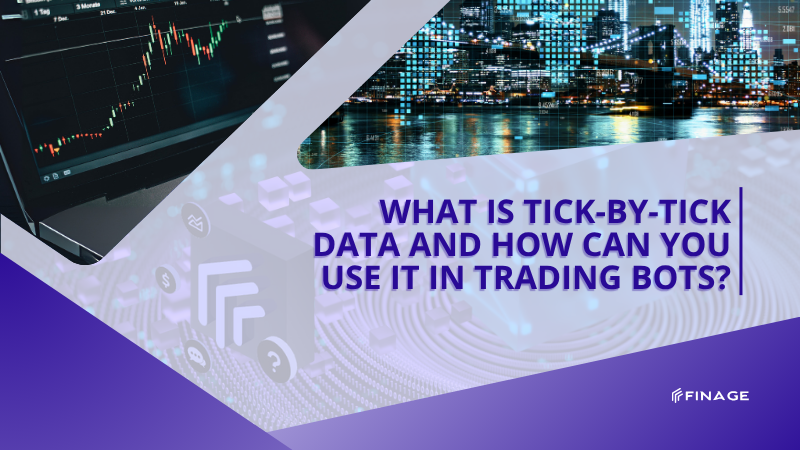The Role of Blockchain in Enhancing Security and Privacy of Financial Data: A Finage Approach
6 min read • April 22, 2023

Introduction
Table of Contents
Introduction
Immutable Records and Data Integrity
How Finage Utilizes Blockchain for Data Security
Scalability and Network Capacity
Final Thoughts
In the digital age, data security and privacy have become paramount concerns for businesses and individuals alike, especially in the financial sector. The constant threat of data breaches and cyberattacks has pushed the need for innovative solutions that can safeguard sensitive financial information. Blockchain, the revolutionary technology behind cryptocurrencies like Bitcoin, has emerged as a potential game-changer in enhancing the security and privacy of financial data. In this blog, we will explore the role of blockchain in bolstering data protection and how Finage, a pioneering financial data provider, utilizes blockchain to ensure the utmost security for its users.
Understanding Blockchain
Blockchain is a decentralized and immutable ledger that records transactions across a network of computers. Each transaction is encrypted and added to a block, which is linked to the previous one, forming a chain of blocks. The decentralized nature of blockchain eliminates the need for a central authority, making it resistant to tampering and fraud. Moreover, the consensus mechanism used in blockchains ensures that all participants agree on the validity of transactions, further strengthening the network's security.
Enhancing Security with Blockchain
1-)Immutable Records:
One of the key features of blockchain is its immutability. Once a transaction is recorded on the blockchain, it cannot be altered or deleted, providing an unchangeable history of financial data. This feature ensures the integrity of financial records and prevents fraudulent activities.
2-)Decentralization: Traditional financial systems often rely on centralized databases, making them vulnerable to single points of failure and cyberattacks. In contrast, blockchain operates on a decentralized network, where data is distributed across multiple nodes. This distribution of data reduces the risk of data breaches and ensures the availability of financial data even if some nodes fail or are compromised.
3-)Encryption and Hashing: Blockchain utilizes advanced cryptographic techniques to secure data. Each transaction is encrypted and linked to the previous block using cryptographic hashes. These hashes act as unique identifiers for each block and any attempt to modify the data within a block would require recalculating all subsequent hashes, making it computationally infeasible and easily detectable.
4-) Permissioned Access: Blockchain allows for granular control over data access. In the financial sector, where sensitive information needs to be shared selectively, permissioned blockchains can be implemented. Only authorized participants can access and view specific data, adding an extra layer of security to financial information.
5-) Smart Contracts: Smart contracts are self-executing agreements with predefined rules written into code on the blockchain. These contracts automatically execute once the specified conditions are met. They enhance security by eliminating the need for intermediaries and reducing the risk of human error and manipulation.
The Role of Finage
Finage is a forward-thinking financial data provider that has harnessed the power of blockchain to revolutionize data security and privacy in the financial sector. By leveraging blockchain technology, Finage ensures that financial data remains tamper-proof and accessible only to authorized parties.
Data Integrity: Finage utilizes blockchain's immutability to create an auditable and transparent record of financial data. This enables users to verify the accuracy and integrity of the data they receive.
Secure Data Sharing: With permissioned blockchain networks, Finage enables secure data sharing among verified participants. Financial institutions, investors, and businesses can exchange sensitive information confidently, knowing that it is protected from unauthorized access.
Real-time Updates: Finage's blockchain-based platform allows for real-time updates of financial data. This ensures that users have access to the most current and accurate information, crucial for making informed financial decisions.
Privacy Protection: By using cryptographic techniques, Finage ensures that the privacy of individuals and businesses is safeguarded. Personally identifiable information (PII) is encrypted and protected, reducing the risk of identity theft and other data-related crimes.
The Future of Blockchain in Financial Data Security
As the potential of blockchain technology in enhancing financial data security becomes more evident, its adoption is expected to grow across the financial industry. Several factors contribute to the bright future of blockchain in this domain:
- Regulatory Compliance: Compliance with data protection regulations is a critical concern for financial institutions. Blockchain's inherent security features and transparency make it easier for businesses to adhere to regulatory requirements, such as the General Data Protection Regulation (GDPR) and the Payment Card Industry Data Security Standard (PCI DSS).
- Cross-Border Transactions: Blockchain can facilitate faster and more secure cross-border transactions by eliminating the need for intermediaries and reducing settlement times. This could lead to significant cost savings and improved efficiency in global financial operations.
- Supply Chain Finance: Blockchain can play a vital role in enhancing supply chain finance by creating a trusted and transparent ecosystem. It enables real-time tracking of transactions, inventory, and payments, reducing the risk of fraud and ensuring timely payments to suppliers.
- Tokenization of Assets: The ability to tokenize assets on the blockchain can unlock liquidity and improve access to investment opportunities for a broader range of investors. Tokenization can represent ownership of real estate, art, stocks, or other assets, making traditionally illiquid assets more accessible and transferable.
- DeFi (Decentralized Finance): The rise of decentralized finance applications built on blockchain platforms allows for the creation of open, permissionless financial services that offer a level of accessibility and transparency not possible in traditional financial systems.
Challenges and Considerations
While the potential benefits of blockchain in enhancing financial data security are substantial, there are still challenges and considerations that need to be addressed:
- Scalability: As blockchain networks grow, the issue of scalability arises. Public blockchains like Bitcoin and Ethereum face limitations in transaction processing speed and capacity. Efforts are underway to develop solutions such as sharding, layer-two protocols, and blockchain interoperability to address this concern.
- Interoperability: The financial industry relies on a multitude of systems and platforms. For blockchain to gain widespread adoption, it must integrate seamlessly with existing infrastructure. Developing interoperable standards is essential to create a cohesive and efficient financial ecosystem.
- Regulation and Standards: As blockchain technology continues to evolve, regulatory frameworks and industry standards need to keep pace. Clear guidelines and regulations are necessary to ensure compliance and build trust in blockchain-based financial systems.
- Security of Smart Contracts: While smart contracts can automate processes and reduce reliance on intermediaries, they are not immune to vulnerabilities. Auditing and rigorous testing of smart contract codes are crucial to prevent exploits and potential financial losses.
Final Thoughts
Blockchain technology has emerged as a powerful force in enhancing the security and privacy of financial data. Its decentralized, immutable, and transparent nature offers a robust solution to combat data breaches, fraud, and unauthorized access. Finage, with its innovative approach to leveraging blockchain, has set a high standard for financial data providers, ensuring that sensitive information is safeguarded and accessible only to authorized parties.
As the financial industry continues to explore the potential of blockchain, ongoing research, collaboration, and regulatory support will be essential in overcoming challenges and realizing the full potential of this transformative technology. Embracing blockchain in financial data management promises to revolutionize the industry, ushering in a new era of trust, efficiency, and security.
You can get your Real-Time and Historical Cryptocurrency Data with Finage free Crypto Data API key.
Build with us today!
Claim Your Free API Key Today
Access stock, forex and crypto market data with a free API key—no credit card required.

Stay Informed, Stay Ahead
Finage Blog: Data-Driven Insights & Ideas
Discover company news, announcements, updates, guides and more


